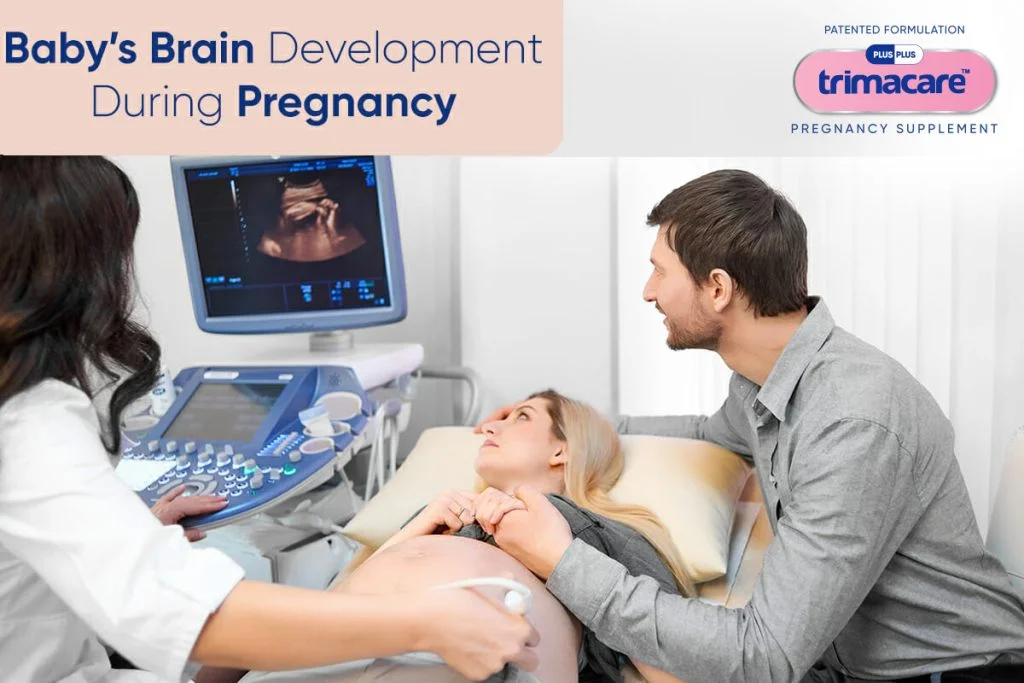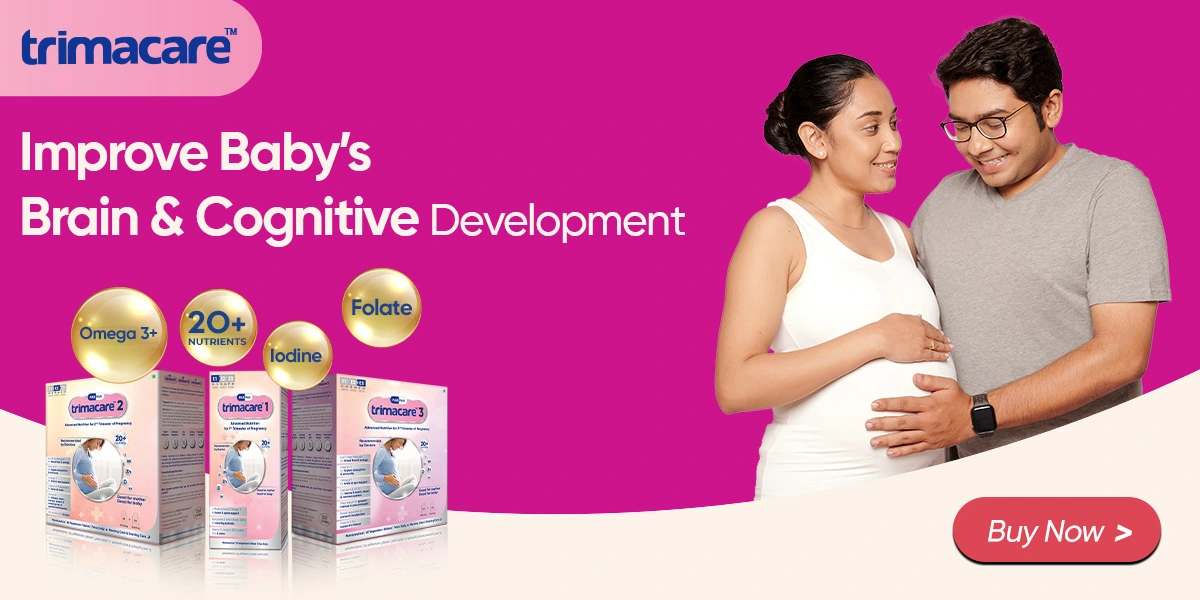The kind of care, environment, nutrition, and healthcare a pregnant woman receives influence the growth and development of the fetal brain, and its lifelong impact. If babies get the right start, it can help their brain reach its full potential.
Brain Development in Foetus During Pregnancy
The brain development of the fetus during pregnancy can be influenced by not only the lifestyle, diet, mental health, and healthcare during pregnancy, but before pregnancy also. The health of the parents before getting pregnant, or “Preconception Health” determines pregnancy outcomes as a lot of people don’t know they are pregnant until after a few weeks of conception.
Deficiencies of nutrients, alcohol consumption, drug use, poor habits, and unhealthy lifestyle during this period can negatively influence the fetus’s brain growth and development.
Brain Development during different trimesters
After a few weeks of conceiving, your embryo would begin to form a neural plate, which is the base of the nervous system. This neural plate further develops into the neural tube, that forms the brain and the spinal cord.
After the closure of the neural tube around the week 6 and 7, it separates the brain into three parts known as the front brain, midbrain, and hindbrain.
During the first trimester, the development of the brain is rapid, and the brain grows millions of neurons that would communicate with each other.
During the 2nd trimester, the fetal brain can direct the compression of chest muscles and diaphragmatic breathing. These are known as “practice breaths” controlled by the brain stem. Sucking and swallowing begin around week 16 and by week 21 the fetus can swallow the amniotic fluid. Between week 16 and week 20 you might be able to feel the baby’s kicks, which are directed by the cerebellum in the brain. During this time the fetus also develops specific fetal movements. The brain stem develops by the end of the second trimester. The nervous system has developed enough that the baby can detect loud noises, experience brainwaves and sleep cycles with the REM Sleep, where dreaming occurs.
During the third trimester, there is exponential growth and development of the neurons and the brain. The cerebrum begins to develop ridges and grooves and separates into the left and right hemispheres. As the cerebrum is responsible for motor control, the baby would begin to do more movements such as kicking, wiggling fingers and toes, kicking, and stretching. The fetal sensory system starts to show integration as well as functionality during this trimester.
Cognitive Skills and ADHD in Foetus
The mother’s nutrients, lifestyle choices, and habits have an impact on the foetus not just during the pregnancy, but well into the baby’s life. The nutrients that a mother consumes support the structural as well as the functional growth of the brain of the foetus.
If the diet of the pregnant is insufficient in micronutrients, it can be supplemented by Prenatal Vitamins. Prenatal multivitamins along with a nutrient-dense diet would fulfil that the nutrient requirements of the pregnant mother and the baby. necessary micronutrients and macronutrients are essential for the synthesis of neurotransmitters (chemicals that transmit signals), maintenance of the nervous system, and structural health of the nervous system. Studies have also shown that the babies of pregnant mothers who are Vitamin D deficient are at an increased risk for attention deficit hyperactivity disorder (ADHD). Pregnant women must consume the required amount of nutrients for themselves and the health of their babies.
Supporting the Baby’s Brain Development
Your baby’s brain development is influenced by the nutrients you are consuming as well as the lifestyle choices you make. Your nutrition should be in alignment with your goals of ensuring that your baby’s brain can develop adequately trimester-wise.
- Get the right nutrients – Pregnancy increases the requirement of some very specific such as – Folate, Omega 3s, Calcium, Iron, Iodine, etc. You must eat a diet that is not just calorie-dense, but nutrient-dense.
- Eat Prenatal Vitamins – Pregnant women require increased amounts of nutrients, the requirements of which cannot be met by diet alone. To avoid nutritional deficiencies during pregnancy, you must consume prenatal vitamins that have been formulated specifically for pregnant women. Ensure that your prenatal vitamins have a range of micronutrients. Folate or Folic acid supports Brain and spine development and ensures the proper closing of the neural tube, preventing neural tube defects. Also ensure that your Prenatal Vitamins contain Omega 3 fatty acids, as they are the structural fat in the brain, eyes, and nervous system. Omega 3s are vital for brain growth and help develop neural pathways and communication between different parts of the brain. If you’re a vegetarian, choose prenatal pills with vegetarian Omega 3 with DHA such as that derived from Deep-sea Algae.
- Do not consume alcohol – Alcohol severely impacts the growth and development of the baby’s brain.
- Don’t Smoke – Smoking and inhaling cigarette smoke reduces the formation of neurons and impacts the communication between neurons.
- Illness and Infections – If the pregnant woman gets ill or contracts an infection, it can affect the formation of brain cells of the fetus. Ensure that you are following the instructions of your doctor to ensure your optimal health to help the baby grow and develop adequately.
- Manage your stress – Stress can have a negative impact, thereby impacting the health of your baby. Ensure that you are taking the help of your doctor to keep your stress levels in check.
Take Away
The health of the baby depends upon maternal nutrition. The mothers-to-be must be educated about the impact their diet, habits, lifestyle, routine, and health have on the baby. If prenatal nutrition and prenatal health are prioritized, it is possible to prevent several health problems in the baby.
Frequently Asked Questions:
1. What are some cognitive skills that are essential for fetal brain development during pregnancy?
Fundamental mental abilities for fetal mental health during pregnancy incorporate memory arrangement, language advancement, critical abilities to think, and social connection abilities.
2. How does ADHD in the mother affect the cognitive development of the fetus during pregnancy?
ADHD in the mother might possibly affect fetal mental improvement because of elements, for example, hereditary inclination, maternal feelings of anxiety, and potential medicine impacts. Nonetheless, the degree of the effect can shift and may require individualized checking and support.
3. Can maternal nutrition during pregnancy influence the cognitive skills of the fetus?
Yes, maternal nutrition has a significant impact on the cognitive development of the fetus. For the fetus to develop its brain to its full potential, it is essential to consume sufficient quantities of essential nutrients like iron, folic acid, and omega-3 fatty acids.
4. Are there any activities or practices that can enhance fetal cognitive skills during pregnancy?
Taking part in exercises that advance unwinding, like pre-birth yoga or contemplation, keeping a decent eating regimen wealthy in supplements, and decreasing feelings of anxiety can add to improving fetal mental abilities during pregnancy.
5. How can expecting mothers support the cognitive development of their fetus throughout pregnancy?
By attending regular prenatal check-ups, living a healthy lifestyle that includes regular physical activity and adequate sleep, and effectively managing stress levels, pregnant women can support the cognitive development of their unborn children. Furthermore, captivating in animating exercises, for example, perusing out loud or playing music to the baby can likewise uphold mental turn of events.
A Certified Nutritionist with a rich healthcare background in health journalism, the author has immense experience in curating reader-friendly, engaging, and informative healthcare blogs to empower readers to make informed pregnancy-related decisions.













